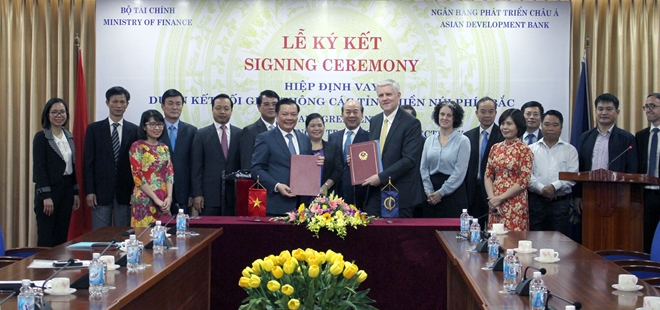ADB loan signed to improve connectivity in Northwestern moutain provinces
- WB to consider more loans for infrastructure projects in Binh Duong
- Vietnam among world’s top recipients of ODA, soft loans
The loan will finance the improvement and upgrade of 198 kilometers of roads that connect several towns and districts in the provinces of Lai Chau, Lao Cai and Yen Bai to the Noi Bai-Lao Cai Expressway, a part of the Greater Mekong Subregion (GMS) Kunming—Hai Phong Transport Corridor that connects the Ha Noi region to the north of Viet Nam and to Yunnan Province in the People’s Republic of China.
The Australian Government will provide a grant of $4.481 million to finance the detailed engineering design of the project roads. The grant will also support programs for axle load control, HIV/AIDS and human trafficking, and awareness campaigns for road safety to help local people in these disadvantaged areas deal with increased traffic speed and volume on the expressway.
 |
“The project aims to expand the benefits of the GMS corridors to the northwestern provinces,” said Mr. Eric Sidgwick, ADB Country Director for Viet Nam. “The improved connectivity will not only boost border trade, private investment and job creation in the region, but also provide better access to basic social services, such as education, health care, job training and emergency disaster relief for the people of the northwestern provinces, especially the poor ethnic minorities.”
Viet Nam’s northwest region, a high mountainous region comprising the provinces of Dien Bien, Hoa Binh, Lai Chau, Lao Cai, Son La and Yen Bai, lags behind the rest of the country, with the poverty rate ranging from 18% to 45% in 2016. The region relies on small-scale industrial companies, such as stone, metal ore exploitation and processing.
The improved network connectivity with the ADB-financed Noi Bai-Lao Cai Expressway, considered the backbone of the Northwest region’s road network, will further spread the benefits of the existing expressway to the people living in the northwestern region. The project will ensure high standards for road construction and addressing the risks posed by climate change, including climate resilience features such as slope protection measures in areas prone to landslides and rockfalls.
ADB is committed to achieving a prosperous, inclusive, resilient, and sustainable Asia and the Pacific, while sustaining its efforts to eradicate extreme poverty. Established in 1966, it is owned by 67 members—48 from the region. In 2017, ADB operations totaled $32.2 billion, including $11.9 billion in cofinancing.

